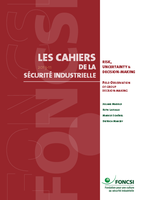A field study of group decision-making in health care
- Juliane Marold
- Ruth Lassalle
- Markus Schöbel
- Dietrich Manzey
- Issue
- 2013-11
- Number of pages
- 34 pages
- Type in collection
- Apport de la recherche
- Interest
- Les Facteurs Humains Et Organisationnels De La Securite

Available formats
![]() CSI-NDM-field-observations.epub — for ePub readers
CSI-NDM-field-observations.epub — for ePub readers ![]() CSI-NDM-field-observations.mobi — for Kindles
CSI-NDM-field-observations.mobi — for Kindles
Abstract
The authors have undertaken a field study of daily decision-making processes in groups under uncertainty, in the health care domain. The work follows the tradition of naturalistic decision-making (NDM) research. It aims to understand how groups in this high reliability context conceptualize and internalize uncertainties, and how they handle them in order to achieve effective decision-making in their everyday activities.
The work is based on observations of a specific kind of health care meeting where treatment options for cancer patients are discussed, as well as on questionnaires completed by the participating physicians. The researchers have analyzed the strategies used by people to cope with uncertainty, including the order in which these strategies are used. The have analyzed characteristics of decisions where the decision-making process was judged by the experts involved to be “good” or “acceptable”.
The work identifies a new source of uncertainty not found in previous NDM studies: divergent opinions held by decision-makers in the group. A strong hierarchy gradient in play during the meetings is perceived by group members as contributing to poor decision-making performance. The authors suggest a number of techniques which could be used to improve decision-making performance, including the use of formalized decision-support procedures to more clearly distinguish phases of presenting information and evaluating it, and to encourage information exchange between group members. Group leaders could be trained in coaching behaviour in order to improve psychological safety, and other members could be trained to encourage speak-up behaviour (assertiveness).